Independence of 1948 resurrected and revived
By Dr. Telli Rajaratnam
|
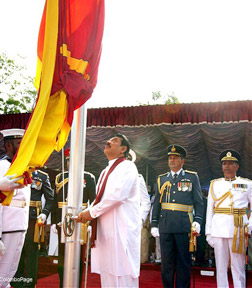
President Mahinda Rajapaksa hoists the National Flag to launch
Independence Day celebrations
|
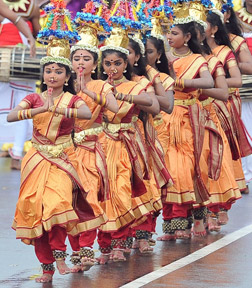 |
|
Dancers participate in a
parade marking Sri Lanka's 65th Independence Day in the
north-eastern town of Trincomalee last year Pic: AFP |
We remember that the Independence of Ceylon (as Sri Lanka was then
known) was gained on February 4, 1948. We obtained independence from
British rule through smooth transition after India gained its
independence.
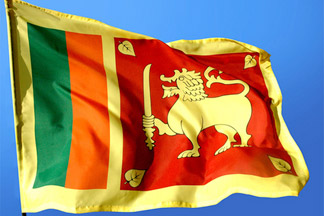
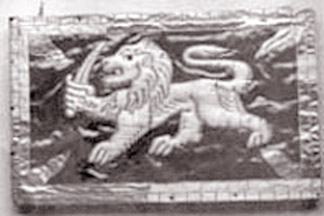
The civil standard of the last king of Sri Lanka, Sri Wickrama
Rajasinha |
Patriots declared that we are a people created equal, free to think
and worship as we feel. We were no longer colonists. We obtained our own
identity and our destiny would not be determined for us, but our destiny
would be determined by us.
We honour our patriots who contributed towards that endeavour.
However, the crucial factor is the independence gained by defeating
terror and granting freedom to the entire nation under the leadership of
President Mahinda Rajapaksa in the midst of so much interference from
developed countries with vested interests. This is a far greater
achievement than any in the history of this country.
There shall be one law for all. The territorial law of Sri Lanka
shall be the same for the entire country. Every citizen has a right to
choose his residence. Every citizen has a right to live in any part of
Sri Lanka. The Tamils must cease to talk of the North and the East as
their homeland. There shall be only one race - the human race. One
nation - the nation of Sri Lanka... One sovereign - the Executive
President... One leader - President Mahinda Rajapaksa, elected by the
people for the people.
National Flag
The National Flag of Sri Lanka represents the country and her
heritage as a rallying symbol that integrates the minorities with the
majority race. Sri Lanka's National Flag is an improvisation of the
civil standard of the last king of Sri Lanka, Sri Wickrama Rajasinha.
The civil standard had a passant royal lion with a sword in its right
forepaw at the centre, and a Bo leaf on each of the four corners on a
plain border. When Sri Lanka gained independence from Great Britain on
February 4, 1948, it was the Lion Flag of the last king of Sri Lanka
which was hoisted once again. The first Prime Minister of independent
Sri Lanka, D.S. Senanayake, appointed a committee to advise the
government on the design of a new national flag. The design approved by
the committee in February1950 retained the symbol of the lion with the
sword and the Bo leaves from the civil standard of the last king of Sri
Lanka, with the inclusion of two vertical stripes in green and orange.
The significance of each symbol of the national flag is as follows:
The lion in the flag represents the Sinhala race.
The sword of the lion represents the sovereignty of the country.
Curly hair on the lion's head indicates religious observance, wisdom and
meditation.
The beard denotes purity of words.
The handle of the sword highlights the elements of water, fire, air and
earth.
The nose indicates intelligence.
The two front paws purport to purity in handling wealth.
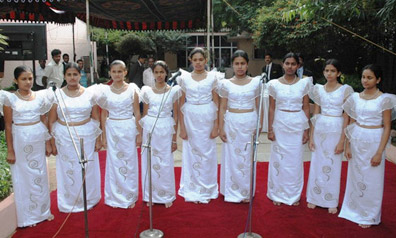 |
|
Students sing the National
Anthem at Independence Day celebrations |
The vertical stripe of orange represents the minority Tamils and the
green vertical stripe, the minority Muslims.
The border around the flag, which is yellow, represents other minor
races.
The Bo leaves at the four corners of the flag represent Buddhism and
its influence on the nation. They also stand for the four virtues -
kindness, friendliness, happiness and equanimity.
The maroon portion of the flag manifests the other religions.
The National Flag was hoisted for the first time on March 3, 1950.
National Anthem
A national anthem should be sung in its original version in the
original language it was composed. All citizens should learn the
meaning, whatever race they may belong to. The National Anthem of Sri
Lanka should be sung in Sinhala: One national anthem, one nation.
Article 7 of the Constitution of the Democratic Socialist Republic of
Sri Lanka states, “The National Anthem of the Republic of Sri Lanka
shall be Sri Lanka Matha, the words and music of which are set out in
the Third Schedule”.
The third schedule contains only the words in Sinhala. As such, the
only valid and legal version of the National Anthem is the official
Sinhala version. Sri Lanka's literacy rate is very high, all citizens
can learn the meaning of the National Anthem and to sing it within an
hour.
A national anthem (national hymn or song) is a patriotic musical
composition that evokes and eulogises the history and traditions of its
people, and is recognised either by a nation's government as the
official national song, or by convention through use by the public.
Certain etiquette may be involved in the playing of a country's
anthem. These usually involve elements such as military honours,
standing up and removing headwear. In diplomatic situations, the rules
may be very formal.
Sri Lanka Matha is the National Anthem of Sri Lanka. The words and
music were written by Ananda Samarakoon in 1940 in Sinhala, and was
officially adopted as the National Anthem on November 22, 1951 by a
committee headed by Sir Edwin Wijeyeratne.
Freedom in Sri Lanka
Through the experience he gained through many political tidal waves
and his survival to become the leader of the nation, President Rajapaksa
knows no fear.
He has no doubts. He thinks hard before he makes decisions; once the
decision has been made, he will justify his cause with his skills of
advocacy which has won over many of his opponents. Never in the
political history of any country has so many Opposition members joined
and supported the President whom they once opposed.
“There go my people, I must follow them, for I am their Leader” were
the words of Mahatma Gandhi, practised to the very syllable by President
Rajapaksa.
That is the secret of his success. Amidst the turbulent waves of
politics and the intricacies of conspiracies by vested interests, he was
re-elected as the President of Sri Lanka for a second term. His victory
was inevitable due to his patriotic deeds and the victorious were the
nation as a whole. Liberation by the saviour of the nation resulted in
thousands of men, women and children driven from their lands returning
home.
The demands of an outraged community have been met. We have achieved
a victory for a safer world, for our democratic values, and for a
stronger Sri Lanka.
We fought and liberated the people held hostage, what we achieved and
what we have to do now to advance peace, and together with the people,
forge a future of freedom, progress and harmony. This can be done only
under the leadership of President Rajapaksa.
The terrorists were the cause for men of all ages to be separated
from their loved ones, killed and forced to join the terrorists,
children made to watch their parents die; a whole people forced to
abandon, within hours, communities their families had spent generations
building. When our diplomatic efforts to avert this horror with the LTTE
were rebuffed, and violence mounted, the President took affirmative
action. Now the people are free, the roads that were closed for years
have opened, the people have been liberated.
Stability of leadership
Finally, we have averted the wider war terrorism may well have
sparked. Now, we're entering a new phase - building peace - and there
are formidable challenges, the foremost amongst them is the stability of
leadership and the Government.
Development
We must build and develop our country. For that to happen, the
European Union must plan for tomorrow, not just today. Our friends - the
United States, China, India and the United Kingdom - must assist us in
our endeavours. They must provide most of the resources for this effort,
but it is in Sri Lanka's interest to do our part as well. We must pave a
path to a prosperous shared future, a unifying magnet more powerful than
the pull of hatred and destruction that has threatened to tear us apart.
Challenges
Sri Lanka still faces great challenges in this world, but we look
forward to meeting them. We can successfully maintain the territorial
integrity of Sri Lanka since we re-elected President Rajapaksa. We must
stand united as patriots of Sri Lanka to support and defend him and
support the 18th Amendment to the Constitution.
Patriotism
Patriotism is the ground norm of a civilised society. As citizens, we
owe allegiance to the Constitution of Sri Lanka and we owe our loyalty
and allegiance to the President. We must appreciate the fact that we
would be the most blessed nation for easy development only if we can
eradicate all the other Tamil terror groups who are terrorising us in
the city of Colombo. The total eradication of terrorism is possible only
if arms are seized from all militant groups who pay lip service to
democracy whilst flirting with the major terrorist group. Civil
allegiance is the duty of loyalty and obedience which a person owes to
the State of which he is a citizen.
Terrorism, diaspora and vested interests
Due to conflicts which we could have long resolved, external forces
with vested interests have all sought to intervene, some in the pretext
of resolving the issue, but our experience has proved that the gap of
resolution does not seem to be narrower now. Those who finance terror
through some NGOs, those who launder their money, and those that cover
their tracks are every bit as guilty as the fanatic who commits the
final act. We look for diplomacy, but there is no diplomacy with some of
those opposed to us. We do not consider them as opponents, but they
oppose every conceivable move we make to develop the country. Sometimes,
there is no compromise with such people, no meeting of minds - no point
of understanding - so we would have a just choice - defeat it or be
defeated by it. We learnt that however much we strive for peace, we need
a strong defence capability where a peaceful approach fails. Whatever
the dangers of the action we take, the dangers of inaction are far
greater.
Laws will have to be changed, not to deny the basic liberties, but to
prevent their abuse and protect the most basic liberty of all; freedom
from terror. The people are terrorised by certain Tamils with vested
interests in their vile pursuits for power committing crimes and
targeting a reflex scenario as if the Government was responsible.
We must always be on guard for those who will exploit and manipulate
for their own narrow political ends, who will distort the essence of
pluralism and tolerance for their own extremist agendas. People are
being tainted by the reckless media. It is a national catastrophe for
the nation. We must enact new laws or amend the old.
We must work as a community to ensure that everyone, not just a
privileged few, get the collective ability to further the individual's
interests. The governing idea of modern social democracy is founded on
the principles of social justice. That people should rise according to
merit not birth; that the test of any decent society is not the
contentment of the wealthy and strong, but the commitment to the poor
and weak.
However, values aren't enough. The mantle of leadership comes at a
price; the courage to learn and change; to show how values that stand
for all ages can be applied in a way relevant to each age.
We learnt that equality is about equal worth and not equal outcomes.
They demand more. The rising cost of living is because of terrorism -
not only the amount we spent on the battle, but the consequences that
follow the false allegation by terrorists and their henchmen in
Parliament who travel on diplomatic passports, enjoy all the perks of
the State, desecrate the sanctity of the House of Parliament and make
false allegations to the world - these include all Tamil militants who
wear a mask of democracy and continue to have the ideals of terrorists -
these men and women will howl and cry through fear that they may not be
elected to Parliament again. They neither love their own people nor the
country.
We are not alone in this. All around the world, governments are
struggling with the same problems. The program of reforms is huge. We
must have co-operation, determination and consensus.
We are a community of people, whose self interests and mutual
interest at crucial points merge and that it is through a sense of
justice that a community is born and nurtured.
This is the moment to bring the faiths closer together, in
understanding our common values and heritage as a source of unity and
strength. By the strength of our common endeavours, we achieve more
together than we can alone. We must reach beyond our fears and divisions
to a new time of great and common purpose. Let us trace the roots of
affirmative action.
Let us determine what it is and what it isn't. Let us see where it
has worked and where it hasn't and ask ourselves what we need to do now.
President Rajapaksa has been stoic in the face of adversity. He has
earnestly endeavoured to unify the nation.
He is totally committed to serve the people. It is genuine,
unwavering and selfless. President Rajapaksa represents tolerance and
freedom, not repression and terror. As such, every individual or group
which transgresses these ideals should be dealt with by the laws of the
land.
The writer Dr. Telli C. Rajaratnam LL.B(SL), LL.M(Lond), Ph.D(Lond)
is a Barrister and Solicitor who had served in Tasmania, Australia and
the United Kingdom and has authored 14 books on law, philosophy and
politics. |

